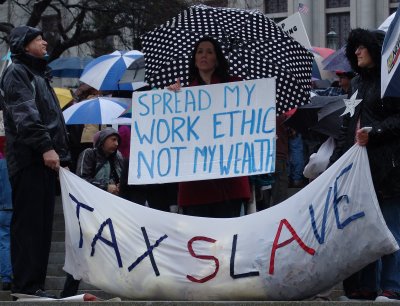Okay, here’s the thing. Fiscal conservatives, usually those on the right-libertarian end of the spectrum, often claim that government should be run like a business. Now, I don’t agree with this; I think business should be run like a business and government should be run like a government, because they are different entities with different goals. I also distrust people who think that there is one solution that can be applied to any problem; when all you have is a hammer, everything starts to look like a nail, and so on.
But.
Let’s say I did agree with this idea. If it’s true, why are these same people so fiercely opposed to taxation?
Follow along with me here: if government is a business, then legislators, presumably, are the managers. (Please do correct me if I’m making a mistaken assumption, because I honestly think I’m missing something in this argument.) The product, one assumes, is the services that the government provides — defense, retirement plans, social services, infrastructure, and so on. The customer would be the citizenry, and the profit would be government revenue in the form of taxation (taxes being the mechanism by which the government collects revenue).
So why are these people dedicated, at their core level, to (a) cutting services and (b) decreasing taxation? If my understanding of the model of government-as-business is correct, this means that their idea of running a business means restricting the goods and services the business provides, and severely limiting, if not eliminating altogether, the price the customer pays for them. This is insane. No one runs a business like that. In fact, most businesses expand and thrive by expanding their product/service line, and by charging as much for their product as they can get away with. Cutting the goods or services offered and stripping prices to the bone is what a failing business does. It’s certainly not what a robust, healthy business does.
Am I missing something? In this model, are the taxpayers supposed to be the owners or the shareholders? If that’s true, who are the customers? Is tax money supposed to be capital instead of income? If so, what’s the income stream in this model? Or, is it possible that I’m overanalyzing this, and that really, they don’t want to run government like a business, but deliberately run it into the ground — something that indicates that I’m right, and that government and private industry are two different animals and should be treated as such?
Just wondering.


The primary objection that right-libertarians (and the conservatives who cater to them*) have to taxes is the involuntary nature of their collection. So when those folks say, “We want the government run like a business,” their primary hope is that paying for the agency in question becomes voluntary and not mandatory.
Take public schools, one of the constant items in this debate. Conservative/libertarians would rather not have to pay for schools they felt were shitty, or dangerous, or not teaching the true descent of man from Adam, etc. If education were a business, as opposed to a weird balance between state-run service and private institution, then the bad schools would wither on the vine. No one would patronize them! The market solves all!
So to answer your question: the ultimate target here is lowering taxes. Coming at it from the “run this like a business angle,” conservative/libertarians think this would lower their tax burden by allowing them to “opt out” of services that don’t fulfill them. Coming at it from the “traditional fiscal policy” angle, conservative/libertarians just want lower taxes.
There aren’t a lot of credible suggestions in other veins, unless you go to the farther corners of the libertarian web (“the FDA should be run like a business!” “privatize the fire department!” et cetera). Was there a specific example you had in mind?
____________
* Or vice versa; it’s a relationship I’ve never fully understood. This is why I no longer call myself a libertarian.
No specific example, but as per the photo, it’s a line I keep hearing from Steve Forbes, who seems to say it reflexively without actually contemplating what it means.
I sort of understand the don’t-make-people-pay-for-programs-they-don’t-want idea as it relates to the government as a business model, but the problem is, there’s nothing even close to a consensus about what programs should be cut. No one wants to touch the really big entitlements like SS or Medicare, and most polls indicate that even the real hardcore Tea Party conservatives don’t want to get rid of most of the big government departments, defense, etc. And, of course, they don’t want to raise taxes. So the cuts they end up making don’t make much of a difference.